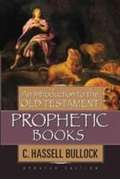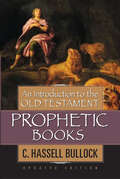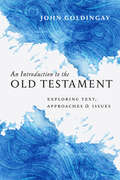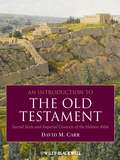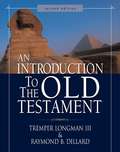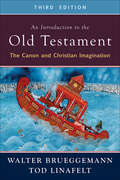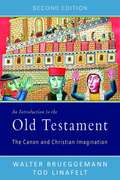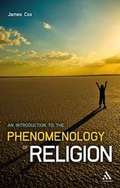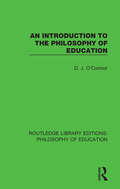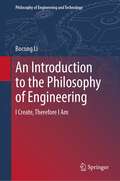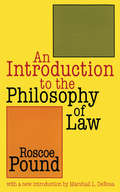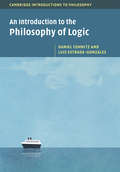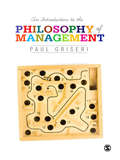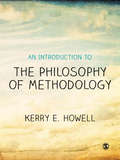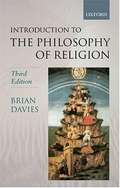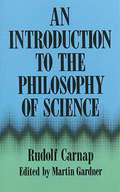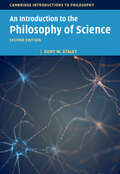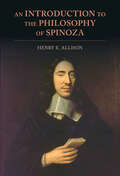- Table View
- List View
An Introduction to the Old Testament Prophetic Books
by C. Hassell BullockThe Old Testament prophets spoke to Israel in times of historical and moral crisis. They saw themselves as being a part of a story that God was weaving throughout history--a story of repentance, encouragement, and a coming Messiah. In this updated introductory book, each major and minor prophet and his writing are clustered with the major historical events of their time. Our generational distance from the age of the prophets might seem to be a measureless chasm. Yet we dare not make the mistake of assuming that passing years have rendered irrelevant not only the Old Testament prophets, but also the God who comprehends, spans, and transcends all time. In these pages, C. Hassell Bullock presents a clear picture of some of history's most profound spokesmen--the Old Testament prophets--and the God who shaped them.
An Introduction to the Old Testament Prophetic Books
by C. Hassell BullockThe Old Testament prophets spoke to Israel in times of historical and moral crisis. They saw themselves as being a part of a story that God was weaving throughout history--a story of repentance, encouragement, and a coming Messiah. In this updated introductory book, each major and minor prophet and his writing are clustered with the major historical events of their time. Our generational distance from the age of the prophets might seem to be a measureless chasm. Yet we dare not make the mistake of assuming that passing years have rendered irrelevant not only the Old Testament prophets, but also the God who comprehends, spans, and transcends all time. In these pages, C. Hassell Bullock presents a clear picture of some of history's most profound spokesmen--the Old Testament prophets--and the God who shaped them.
An Introduction to the Old Testament Prophetic Books
by C. Hassell BullockThe Old Testament prophets spoke to Israel in times of historical and moral crisis. They saw themselves as being a part of a story that God was weaving throughout history--a story of repentance, encouragement, and a coming Messiah. In this updated introductory book, each major and minor prophet and his writing are clustered with the major historical events of their time. Our generational distance from the age of the prophets might seem to be a measureless chasm. Yet we dare not make the mistake of assuming that passing years have rendered irrelevant not only the Old Testament prophets, but also the God who comprehends, spans, and transcends all time. In these pages, C. Hassell Bullock presents a clear picture of some of history's most profound spokesmen--the Old Testament prophets--and the God who shaped them.
An Introduction to the Old Testament: Exploring Text, Approaches & Issues
by John GoldingayEnter the classroom of one of today?s premier biblical interpreters as he shares his infectious love for the Old Testament. This is where you begin the adventure of exploring the Bible?s First Testament. Some Old Testament introductions tell you what you could have seen for yourself. They might recount in detail what other scholars have said, and then tell you what you should think about it. But with refreshing directness, John Goldingay outfits you with basic knowledge, points out the main approaches, outlines the primary issues and then sets you loose to explore the terrain for yourself. Traverse the grand tapestry of the Torah. Discern the art and grain of biblical narrative. Listen to the cries, confessions and cadences of the Psalms. Probe the varied textures of wisdom literature. And ponder the prophets in the darkening nightmare of exile and the distant light of hope. More workbook than handbook, this introduction to the Old Testament is rooted in decades of tried and proven teaching. Goldingay displays a robust confidence in the truthfulness of Scripture combined with a refreshing trust in the reader's ability to grapple responsibly with the Old Testament. Even when the text hits you sideways, Goldingay encourages you not to squirm or run, but to grab hold and go deeper. Under his expert guidance the cordon between faith and criticism swings open into theological and spiritual insight.
An Introduction to the Old Testament: Sacred Texts and Imperial Contexts of the Hebrew Bible (Journal For The Study Of The Old Testament Supplement #No. 225.)
by David M. CarrThis comprehensive, introductory textbook is unique in exploring the emergence of the Hebrew Bible in the broader context of world history. It particularly focuses on the influence of pre-Roman empires, empowering students with a richer understanding of Old Testament historiography. Provides a historical context for students learning about the development and changing interpretations of biblical texts Examines how these early stories were variously shaped by interaction with the Mesopotamian and Egyptian, Assyrian, Babylonian, Persian, and Hellenistic empires Incorporates recent research on the formation of the Pentateuch Reveals how key biblical texts came to be interpreted by Jewish, Christian, and Muslim faiths Includes numerous student-friendly features, such as study questions, review sections, bibliographies, timelines, and illustrations and photos
An Introduction to the Old Testament: Second Edition
by Tremper Longman IIIAn upper-level introduction to the Old Testament that offers students a thorough understanding of three key issues: historical background, literary analysis, and theological message.This second edition of An Introduction to the Old Testament integrates recent developments in Old Testament scholarship. It has many distinctive features that set it apart from other introductions to the Old Testament:It's committed to a theologically evangelical perspective.Emphasizes "special introduction"—the study of individual books.Interacts in an irenic spirit with the historical-critical method.Features points of research history and representative scholars rather than an exhaustive treatment of past scholarship.Deals with the meaning of each book, not in isolation but in a canonical context.Probes the meaning of each book in the setting of its culture.Including callouts, charts, and graphs, An Introduction to the Old Testament is written with an eye to understanding the nature of Old Testament historiography.Perfect for seminary students, professors, and Bible teachers and ministry leaders, as well as anyone looking for an in-depth and balanced approach to Old Testament study.
An Introduction to the Old Testament: The Canon and Christian Imagination
by Walter Brueggemann and Tod LinafeltAn Introduction to the Old Testament: The Canon and Christian Imagination (Second Edition)
by Walter Brueggemann Tod LinafeltIn this updated edition of the popular textbook, Walter Brueggemann and Tod Linafelt introduce the reader to the broad theological scope of the Old Testament, treating some of the most important issues and methods in contemporary biblical interpretation. This clearly written textbook focuses on the literature of the Old Testament as it grew out of religious, political, and ideological contexts over many centuries in Israel's history. Covering every book in the Old Testament (arranged in canonical order), the authors demonstrate the development of theological concepts in biblical writings from the Torah through post-exilic Judaism. This introduction invites readers to engage in the construction of meaning as they venture into these timeless texts.
An Introduction to the Phenomenology of Religion
by James L. CoxIn this revised edition, the author provides an easily accessible introduction to the phenomenology of religion, which he contends continues as a foundational method for the academic study of religion in the twenty-first century. After dealing with the problematic issue of defining religion, he describes the historical background to phenomenology by tracing its roots to developments in philosophy and the social sciences in the early twentieth century. The phenomenological method is then outlined as a step-by-step process, which includes a survey of the important classifications of religious behavior. The author concludes with a discussion of the place of the phenomenology of religion in the current academic climate and argues that it can be aligned with the growing scholarly interest in the cognitive science of religion.
An Introduction to the Philosophy of Art
by Richard EldridgeRichard Eldridge's compact survey of philosophical theories of the nature and significance of art draws on materials from classical and contemporary philosophy as well as literary theory and art criticism. Eldridge explores the representational, expressive, and formal dimensions of art, and argues that works of art present their subject matter as creations of enduring cognitive, moral, and social interest. His accessible study will be of interest to students and anyone interested in the relationship between thought and art.
An Introduction to the Philosophy of Education (Routledge Library Editions: Philosophy of Education #14)
by D. J. O'ConnorEducation, like every other important branch of knowledge, has its underlying philosophical problems. It is these problems and the attempts to solve them which together make up the philosophy of education. This book, first published in 1957, provides a simple explanation and illustration of what philosophy can (and cannot) do for educational thinking. This title will be of interest to students of the philosophy of education.
An Introduction to the Philosophy of Engineering: I Create, Therefore I Am (Philosophy of Engineering and Technology #39)
by Bocong LiThis book is the first academic work on the philosophy of engineering in China that reflects two decades of research. It puts forward a new thesis, namely that the core maxim in the philosophy of engineering is “I create, therefore I am,” which is radically different from the Cartesian maxim: “I think, therefore I am.” In addition, the book offers the first detailed portrait of the roots and evolution of the philosophy of engineering in China. The book begins by discussing the triptych thesis of science, technology and engineering, which argues that there are a number of important distinctions between the three, e.g. scientific activities are chiefly based on discovery, while technological activities center on invention, and engineering activities focus on creation. Considering the latest developments in the philosophy of engineering, the author also analyzes engineering communities, engineering practice and a micro–meso–macro framework. In subsequent chapters, the author separately analyzes the three stages of engineering activities: planning, operating and using artifacts. In the closing chapter, two views on the philosophy of engineering (as a new subdiscipline of philosophy and as a philosophy in its own right) are briefly explained.
An Introduction to the Philosophy of Language
by Michael MorrisIn this textbook, Michael Morris offers a critical introduction to the central issues of the philosophy of language. Each chapter focusses on one or two texts which have had a seminal influence on work in the subject, and uses these as a way of approaching both the central topics and the various traditions of dealing with them. Texts include classic writings by Frege, Russell, Kripke, Quine, Davidson, Austin, Grice and Wittgenstein. Theoretical jargon is kept to a minimum and is fully explained whenever it is introduced. The range of topics covered includes sense and reference, definite descriptions, proper names, natural-kind terms, de re and de dicto necessity, propositional attitudes, truth-theoretical approaches to meaning, radical interpretation, indeterminacy of translation, speech acts, intentional theories of meaning, and scepticism about meaning. The book will be invaluable to students and to all readers who are interested in the nature of linguistic meaning.
An Introduction to the Philosophy of Law (Storrs Lecture)
by Roscoe Pound Marshall. L DeRosaIn An Introduction to the Philosophy of Law, Roscoe Pound shows how philosophy has been a powerful instrument throughout the history of law. He examines what philosophy has done for some of the chief problems of the science of law and how it is possible to look at those problems philosophically without treating them in terms of a particular time period. The function of legal philosophy, writes Pound, is to rationally formulate a general theory of law which conforms to the interests, the general security first and foremost, of society. Marshall DeRosa writes in his new introduction that in the light of twentieth-century judicial politics, Roscoe Pound's philosophy of law has prevailed to a significant extent. This book's relevance to appreciating the development of the American legal system in all its complexities - including liability law, contract law, and property law - is in itself notable. But, in terms of understanding the twentieth-century development of the American rule of law, An Introduction to the Philosophy of Law is indispensable. It will make an invaluable addition to the personal libraries of legal theorists, philosophers, political scientists, and historians of American law.
An Introduction to the Philosophy of Logic (Cambridge Introductions to Philosophy)
by Daniel Cohnitz Luis Estrada-GonzálezPhilosophy of logic is a fundamental part of philosophical study, and one which is increasingly recognized as being immensely important in relation to many issues in metaphysics, metametaphysics, epistemology, philosophy of mathematics, and philosophy of language. This textbook provides a comprehensive and accessible introduction to topics including the objectivity of logical inference rules and its relevance in discussions of epistemological relativism, the revived interest in logical pluralism, the question of logic's metaphysical neutrality, and the demarcation between logic and mathematics. Chapters in the book cover the state of the art in contemporary philosophy of logic, and allow students to understand the philosophical relevance of these debates without having to contend with complex technical arguments. This will be a major new resource for students working on logic, as well as for readers seeking a better understanding of philosophy of logic in its wider context.
An Introduction to the Philosophy of Management
by Paul GriseriWhat and who is business for? What exactly is work and how can we distinguish it from other activity? Do businesses operate along different ethical lines from individuals?<P><P> This clear and accessible text introduces key philosophical concepts and ideas and applies them to fundamental issues in management and organizations. Written for business and management students with no previous knowledge of philosophy, this text will lead readers to question the basic assumptions widely made about business and management. <P> An Introduction to the Philosophy of Management is packed with case studies and examples which provoke thought and discussion. Coverage includes crucial topics such as business ethics, culture and leadership. <P> Key features: <P> - Boxed definitions of key concepts<P> - Real life case studies and examples<P> - Questions for Reflection<P> - Further reading<P> This text is essential reading for any business and management student wanting to think creatively.
An Introduction to the Philosophy of Mathematics
by Mark ColyvanThis introduction to the philosophy of mathematics focuses on contemporary debates in an important and central area of philosophy. The reader is taken on a fascinating and entertaining journey through some intriguing mathematical and philosophical territory, including such topics as the realism/anti-realism debate in mathematics, mathematical explanation, the limits of mathematics, the significance of mathematical notation, inconsistent mathematics and the applications of mathematics. Each chapter has a number of discussion questions and recommended further reading from both the contemporary literature and older sources. Very little mathematical background is assumed and all of the mathematics encountered is clearly introduced and explained using a wide variety of examples. The book is suitable for an undergraduate course in philosophy of mathematics and, more widely, for anyone interested in philosophy and mathematics.
An Introduction to the Philosophy of Methodology
by Kerry E HowellThis book provides students with a concise introduction to the philosophy of methodology. The book stands apart from existing methodology texts by clarifying in a student-friendly and engaging way distinctions between philosophical positions, paradigms of inquiry, methodology and methods. Building an understanding of the relationships and distinctions between philosophical positions and paradigms is an essential part of the research process and integral to deploying the methodology and methods best suited for a research project, thesis or dissertation. Aided throughout by definition boxes, examples and exercises for students, the book covers topics such as: - Positivism and Post-positivism - Phenomenology - Critical Theory - Constructivism and Participatory Paradigms - Post-Modernism and Post-Structuralism - Ethnography - Grounded Theory - Hermeneutics - Foucault and Discourse This text is aimed at final-year undergraduates and post-graduate research students. For more experienced researchers developing mixed methodological approaches, it can provide a greater understanding of underlying issues relating to unfamiliar techniques.
An Introduction to the Philosophy of Psychology
by Fred Adams Daniel A. WeiskopfPsychology aims to give us a scientific account of how the mind works. But what does it mean to have a science of the mental, and what sort of picture of the mind emerges from our best psychological theories? This book addresses these philosophical puzzles in a way that is accessible to readers with little or no background in psychology or neuroscience. Using clear and detailed case studies and drawing on up-to-date empirical research, it examines perception and action, the link between attention and consciousness, the modularity of mind, how we understand other minds, and the influence of language on thought, as well as the relationship between mind, brain, body, and world. The result is an integrated and comprehensive overview of much of the architecture of the mind, which will be valuable for both students and specialists in philosophy, psychology, and cognitive science.
An Introduction to the Philosophy of Religion
by Michael J. Murray Michael C. ReaAn Introduction to the Philosophy of Religion provides a broad overview of the topics which are at the forefront of discussion in contemporary philosophy of religion. Prominent views and arguments from both historical and contemporary authors are discussed and analyzed. The book treats all of the central topics in the field, including the coherence of the divine attributes, theistic and atheistic arguments, faith and reason, religion and ethics, miracles, human freedom and divine providence, science and religion, and immortality. In addition it addresses topics of significant importance that similar books often ignore, including the argument for atheism from hiddenness, the coherence of the doctrines of the Trinity and the Incarnation, and the relationship between religion and politics. It will be a valuable accompaniment to undergraduate and introductory graduate-level courses.
An Introduction to the Philosophy of Religion (Third Edition)
by Brian Davies<p>The third edition of An Introduction to the Philosophy of Religion provides a critical examination of some fundamental questions posed by religious belief: What does belief in God amount to? Can God's existence be proved? Is there life after death? <p>Brian Davies considers these questions and many others, sometimes offering provocative answers of his own, but more often giving readers room to each independent conclusions. He explains how a range of thinkers have approached the subject -- including Anselm, Aquinas, Descartes, Leibniz, Hume, and Kant -- and also discusses how contemporary author now engage with the issues involved. Completely revised to cover the latest developments in the field, the new edition of this established textbook will prove the ideal introduction for all students of the philosophy of religion.</p>
An Introduction to the Philosophy of Science
by Kent W. StaleyThis book guides readers by gradual steps through the central concepts and debates in the philosophy of science. Using concrete examples from the history of science, Kent W. Staley shows how seemingly abstract philosophical issues are relevant to important aspects of scientific practice. Structured in two parts, the book first tackles the central concepts of the philosophy of science, such as the problem of induction, falsificationism, and underdetermination, and important figures and movements, such as the logical empiricists, Thomas Kuhn, and Paul Feyerabend. The second part turns to contemporary debates in the philosophy of science, such as scientific realism, explanation, the role of values in science, the different views of scientific inference, and probability. This broad yet detailed overview will give readers a strong grounding whilst also providing opportunities for further exploration. It will be of particular interest to students of philosophy, the philosophy of science, and science.
An Introduction to the Philosophy of Science
by Rudolf CarnapOne of the most creative philosophers of the 20th century, Rudolf Carnap presented a series of science lectures at the University of California in 1958. The present volume is an outgrowth of that seminar, which dealt with the philosophical foundations of physics. Edited by Martin Gardner from transcripts of Carnap's classroom lectures and discussions, the book remains one of the clearest and soundest introductions to the philosophy of science.Specially designed to appeal to a wide range of readers, An Introduction to the Philosophy of Science offers accessible coverage of such topics as laws and probability, measurement and quantitative language, the structure of space, causality and determinism, theoretical laws and concepts and much more. Stimulating and thought-provoking, the text will be of interest to philosophers, scientists and anyone interested in logical analysis of the concepts, statements and theories of science. Foreword to the Basic Books Paperback Edition, 1974 (Gardner); Preface (Carnap); Foreword to the Dover Edition (Gardner). 35 black-and-white illustrations. Bibliography.
An Introduction to the Philosophy of Science (Cambridge Introductions to Philosophy)
by Kent W. StaleyThis thoroughly updated second edition guides readers through the central concepts and debates in the philosophy of science. Using concrete examples from the history of science, Kent W. Staley addresses questions about what science is, why it is important, and the basis for trust in scientific results. The first part of the book introduces the central concepts of philosophy of science, with updated discussions of the problem of induction, underdetermination, rationality, scientific progress, and important movements such as falsificationism, logical empiricism, and postpositivism, together with a new chapter on social constructionism. The second part offers updated chapters on probability, scientific realism, explanation, and values in science, along with new discussions of the role of models in science, science in policy-making, and feminist philosophy of science. This broad yet detailed overview will give readers a strong grounding in philosophy of science whilst also providing opportunities for further exploration.
An Introduction to the Philosophy of Spinoza
by Henry E. AllisonAimed at those new to studying Spinoza, this book provides a comprehensive introduction to his thought, placing it in its historical and philosophical contexts, and assessing its critical reception. In addition to providing an analysis of Spinoza's metaphysical, epistemological, psychological, and ethical views in the Ethics, Henry Allison also explores his political theory and revolutionary views on the Bible, as well as his account of Judaism, which led to the excommunication of the young Spinoza from the Jewish community in Amsterdam. Although the book's main focus is on the analysis of Spinoza's views, including a close reading of the central arguments of the Ethics, it also considers many of the standard objections to these arguments as well as possible responses to them. This completely revised and updated new edition of Allison's classic book, with two new chapters, will help a new generation of students to understand and value Spinoza's work.
